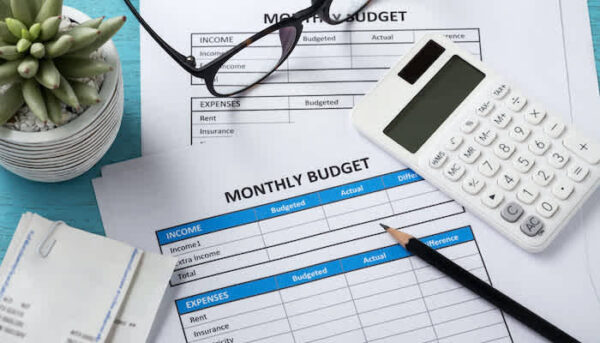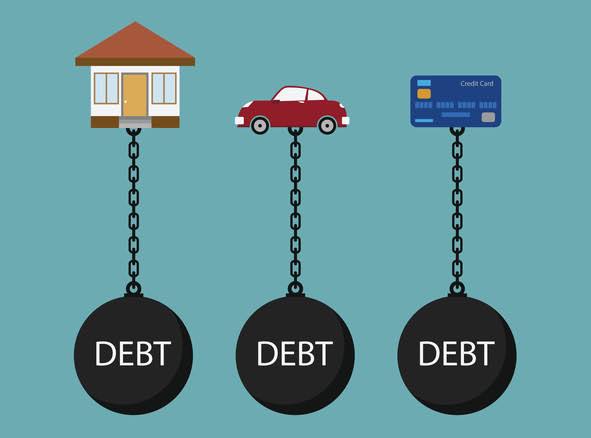Last updated Mar. 12, 2023 by Favour Chinaza
Budgeting for unexpected or irregular expenses can be difficult and unpleasant. Your budget appears to be in good shape one minute and then seems to be hanging by a thread the next. It’s almost enough to make you want to throw in the towel on your budget. In this article, “Budgeting for Unexpected Expenses: 11 Best Ways to Avoid Disaster,” we will go over exactly what you need to do to avoid collapsing under unexpected financial circumstances.
Then, when you have to tap into your emergency fund or money set aside for unforeseen bills or events, money management techniques can help you stay on track.
Budgeting can be fun when planned for. First, however, let us explain how we budget for unforeseen expenses using money and budget ideas. These steps to avoid budgeting disasters should assist you in anticipating and planning for the unexpected expenses that are now hurting your budget.
Budgeting for irregular expenses like rent, monthly insurance premiums, or food is simple: just set aside money for each of them every month.
But what about the cost of car servicing, which should be done every 3-5 months? What are you getting your parents and close friends for Christmas? Your youngster’s music class has decided to take on the spur of the moment? Or how about the half-yearly medical insurance payment?
These expenses fall into the category of “irregular” or “seasonal.” These costs arise at various times of the year and, if not accounted for in particular months, might either drain your funds for the month or force you to borrow (credit card/loan). This increased debt can cause you to fall behind your financial goals for several months.
What are Unexpected Expenses

Irregular expenses don’t happen every month and usually catch us by surprise. They can be bills or other things that make us spend more money than planned during the month. We usually don’t think about them. Each odd expense can happen anywhere from 1 to 6 times a year. Some of these are events, special occasions, and bills that don’t come monthly.
Even though we know we have to pay them monthly, we often forget about them until we get the bill or see the upcoming event on our calendar.
When we forget about them, they turn into unplanned expenses, which can mess with our minds when trying to stick to a budget because they often cause us to spend more than we planned during the month.
Also, there’s always some odd cost that comes up every month. So even if we think “reset the clock” when the months change, something new always gets in the way.
But there is good news here. We just need to do a little planning, and we’ll finally be able to stick to a budget. More to come on that.
Unexpected Expenses Examples
Here’s a long list of irregular expenses that can affect your finances if not well planned. It’s no surprise that budgets fail! There’s always something going on!
Read also, 10 Best Free Personal Finance Software (2022 Update)
Home Maintenance
- New home appliances, repair, or replacement
- Furniture replacement and additions
- Tree care and removal
- General Home repairs
- Bedding, linens, and kitchenware
- Home maintenance (lawn care, pest control, etc.)
- Homeowners’ association dues
- Garden expenses
Holiday Expenses
- Valentine’s Day
- Thanksgiving
- Easter / Passover / Ramadan
- Mother’s Day
- Halloween
- Father’s Day
- Net Year/ Christmas
Family Occasions & Kids Activities
- Birthdays (for each family member)
- Anniversary
- Activity fees (sports leagues, gymnastics, dance, martial arts, music lessons, etc.)
- Private school tuition
- Back-to-school supplies & clothing
- Spring break plans
- Summer camp dues
- Winter break plans
- Car maintenance (oil change, etc.)
Medical Expenses
- Annual medical visits
- Eye doctor visits
- Vet bills
- Dentist / Orthodontist
- Prescriptions (non-monthly)
Education Expenses
Being in school, or having kids that are in school, gets expensive in a hurry. Here are some expenses that are likely to pop up:
- Tuition bills
- Class dues
- Technology fees
- School and office supplies
- School pictures and yearbooks
- Field trips
- Testing fees
Insurance Expenses
Your insurance bills could come once a month, once a year, or four times a year. Plan for these costs in your budget, so the premiums don’t catch you by surprise. Here are some types of insurance you might have and need to account for in your budget:
The premium for homeowner’s or renter’s insurance: If you don’t include this in your mortgage payment, like through an escrow account, or if you’ve already paid off your house, you’ll need to make a plan to make sure you have the money when it’s due. Irregular insurance expenses include:
- Auto insurance premiums
- Life insurance premiums
- Disability insurance premiums
- Health insurance premiums (if you buy your policy)
- Vision insurance premiums (if you buy your policy)
- Property tax
- Dental insurance premiums (if you buy your policy)
- Umbrella insurance premiums
Other Irregular Expenses
- Quarterly estimated taxes
- Credit card annual fees
- Amazon Prime Membership
- Annual membership dues
- Travel / Vacations
- Charity / Annual Giving
Best Ways to Avoid Irregular Expenses Disaster

1. Create a Miscellaneous Category in Your Budget
Now is the time to add a “Miscellaneous” category to your budget if you don’t already have one. No matter how regular your spending is, you will sometimes forget an expense or get a bill you didn’t expect. There will always be unexpected spending, whether it’s a once-a-year trip to the doctor, a new pair of glasses, or the once-a-quarter visit from the pest control company.
By putting these unexpected expenses in a “catch-all” category, you can be sure that you have a place for them in your budget. You won’t have to take money from other parts of your budget to pay for these costs.
How Much Money Should You Set Aside from Unexpected Expenses?
Generally, you should set aside between 1% and 5% of your monthly income for unexpected expenses. When deciding on this percentage, you should consider how consistent your monthly costs are and how well your budget works.
For example, if you’re new to budgeting and still working out the kinks in your spending, you might want to set aside about 5% of your monthly income for unexpected expenses. On the other hand, if your monthly expenditure is pretty stable and you have your budget down to a science, you might only give away 1% of your income.
As with any financial choice, you need to consider your options and decide which is best for you.
2. Make Budgeting Adjustments In Order Of Priority
If unexpected expenses deplete your monthly budget, you may need to make some adjustments to recover the funds. But, before you make any significant changes, you must determine which areas you can withdraw funds from without jeopardizing your progress toward your financial goals.
In other words, you should prioritize the categories from least important to most important. For example, whenever you need to make a budget change to cover an unforeseen expense, always start with spending on comfort items.
Typically, this will cover the expense if you run out of money in this category. Usually, raiding your auto budget and then food budget does the job.
You can usually find a few more dollars in your family or personal budget without slowing down your financial progress because you, for instance, can drive less and spend less on groceries.
Related: 21 Ways To Make Budgeting Fun
The primary goal of this exercise is to ensure that your monthly savings are only used as a last resort. Because saving and investing your money is the entire objective of living on a budget (i.e., your top priority), you should do everything possible to prevent taking money out of savings.
3. Use The Debit-Card-Only Rule

Organizing your expenditures is one of the easiest ways to avoid unexpected expenses. One of the best ways to accomplish this is to follow the debit-card-only rule. In other words, whatever money you spend must originate from your checking account.
What Makes the Debit-Card-Only Rule So Effective?
Because you only need to log in to one account to keep track of your spending.
This makes budgeting extremely quick and straightforward. Furthermore, as all of your spending is routed through a single account, you’ll reduce the possibility of an unexpected expense sliding through the cracks.
We understand that this rule may appear harsh to some. However, from personal experience, you’d be surprised at how much easier this small financial habit can make your life.
4. Keep A Master List Of Your Unexpected Expenses

It’s critical to keep a master list of your irregular spending, whether you keep it electronically or on good old-fashioned paper. Then, you may ensure that you don’t overlook expenses when making your monthly budget.
Items on your master list could include:
- Annual doctor’s visits
- Appointments with the dentist
- Car registration, insurance, and upkeep
- Services for pest control
- Lawn maintenance services
- HOA fees (if applicable)
Some of these fees may be incurred annually, quarterly, or on an as-needed basis.
Regardless, you should consider all the unusual expenses you’ll have to pay throughout the year. Then, add the expense to your master list, including the month it must be paid if possible. Additionally, add it to the list whenever you encounter an unusual expense that has slipped through the gaps.
By keeping your unexpected expenses on a master list, you’ll have a much easier time budgeting for them throughout the year.
Related: 10 Simple Ways To Save Money (Tips For Any Budget!)
5. Be Selective With Automatic Payments
Bill automation is undoubtedly one of the easiest ways to make your financial life more manageable. But this can be a double-edged sword, especially if you set up autopay for a bill you don’t pay monthly.
Because of this, we only suggest setting up automatic payments for fixed, monthly bills.
In other words, if you sign up for something that charges you more than once a month, you should pay for it yourself.
Most of the time, services like these will send you an email to remind you that you have a payment coming up. This, in turn, will eliminate any financial surprises and make it much easier to plan a budget for unexpected expenses that don’t happen every month.
6. Pay Up Your Consumer Debts

Getting rid of consumer debt is another way to make unexpected expenses easier to handle. For example, if you have a balance on your credit cards or other loans (like personal loans or student loans), the payments you make each month cut into your financial margin.
The way Americans feel about debt is complicated. Americans are so deep in debt that they can’t get out. More than 80% of American adults have too many obligations to pay off. Before the economy went down, all Americans could do was stay afloat in dangerous waters.
But when the economy started to go down, many Americans lost their jobs, and those with the most debt went bankrupt or stopped paying their bills, which left them unable to take care of their families and meet their obligations. In the last five years, Americans’ consumer debt reached $3 trillion, but it just recently passed $4.052 trillion.
How Paying Consumer debt helps
And if you have less money left over, it will be harder to pay for unexpected costs. Think about this: for every $500 you spend toward debt each month, you give up $6,000 in savings each year.
That’s a lot of money you could use to pay for unexpected expenses or put toward your savings and investments. Besides that, the more debt payments you have, the more financial obligations you have to keep track of. So when you pay off your consumer debt, you not only make room in your budget but also in your mind.
7. Budget With Your Spouse
There’s no mistake about it: marriage complicates your financial condition. When two people are spending money from the same budget, it is much simpler for unexpected expenses to sneak up on you.
As a result, attempt to budget with your spouse as regularly as possible. From creating your monthly budget to tracking your daily costs, the more you collaborate, the fewer financial surprises you’ll face.
Are you on a budget with your spouse? You can still have fun without breaking the bank. See these 40+ Fantastic Stay-at-Home Date Ideas to try at home.
8. Bolster Your Emergency Fund

Now is the time to start an emergency fund if you don’t already have one. An emergency fund is a savings account used to pay for things like a car repair or a medical bill you didn’t plan for. Your emergency fund should have enough money to cover your living costs for three to six months.
This will ensure you have enough money to get by if you lose your job or have other significant financial problems. Emergency fund always comes in to handle unexpected expenses.
Even though having an emergency fund won’t wholly eliminate unexpected expenses, it will give you a safety net if you’ve used up all your other budgeting options. And in the long run, it will help you avoid going into debt to pay for large, unexpected bills.
Financial experts disagree on how much people should save for unexpected costs. Still, most say that people should set up their paychecks to automatically put money into separate accounts that are only used for emergencies. Then, your savings will grow without you having to do anything, and the money won’t get mixed up with the money in your other accounts.
9. Be Up-to-date with Your Daily Budget
Updating your budget daily is another excellent way to deal with irregular or unexpected expenses. I understand that this seems like a lot of work. But it is much easier to stick to a budget if you update it.
When you update your budget daily, you get a picture of your finances right now. Updating your budget daily lets you quickly see where you might be spending too much and make changes to your spending. Also, if an unexpected expense comes up, you can make a plan for it right away in your budget.
10. Pay Yourself First And Last
One of the best pieces of advice paypant.com recommends about making a budget for unexpected expenses is to pay yourself first and last. In other words, make it a habit to put money away for savings and investments before you pay your bills.
Also, at the end of the month, you should put any money you have left into savings after you’ve paid all your other bills.
How Does Paying Yourself Help You Plan Your Budget for Unexpected Expenses?
If you save first and last, you can put extra money into your “other” expense category instead of saving too much and making your budget too tight. Then, at the end of the month, if you haven’t had any unexpected expenses or costs incurred, you just put that money into savings.
11. Take Out a Short-term Personal Loan

Getting a short-term personal loan from your bank can help you pay for a one-time expense you didn’t plan for. Think about getting $100 to $1,000 in small loans that you can pay back in a reasonable amount of time. With these loans, you don’t have to pay for something all at once. Instead, you can pay for it over several months. Carefully look over the terms of any loan agreement, especially the fees and interest rates you might have to pay. Depending on the lender, some of these could be pretty high.
What Kinds of Unexpected Expenses Should You Plan For?
Many things can cause unexpected costs. Some expenses come from using more heat and electricity, making emergency home repairs, and doing general winter cleanup. During the year, you might have to pay for things like:
- Car repairs
- Medical bills
- Annual insurance premiums, Gifts
- Special occasions
- Sports fees, and
- Costs to join activities.
The list can seem almost endless.
How Do Unexpected Expenses Affect Your Budget?
Many Americans live paycheck to paycheck and don’t have up to $250 to spare. So when an unexpected $1,000 bill comes, it would be too much for them to handle. However, if you plan, you can ensure you have money in the bank for unexpected costs. The first thing to remember is sudden expenses like medical emergencies or funeral travel. In contrast, others are irregular, like holiday travel or a monthly water bill.
Start by building an emergency fund to plan for truly unexpected costs. You should save enough money to cover at least six months’ bills. First, look at how much you spent in the last 12 months and determine your irregular costs. Then, save money throughout the year to be ready for them when they come up.
Related: Signs You Don’t Make Enough Money? Here’s What to Do
Even if you plan your budget to the penny, you will still have some unexpected expenses that you didn’t budget for. So how can you set money aside for these costs? Even better, how can you stop them from blowing up your finances?
Unexpected vs. Irregular Expenses
Knowing the difference between unplanned and Overlooked expenses is important to avoid a budgeting disaster. An actual unexpected expense can’t be planned for. Some examples are medical emergencies, major home repairs after a natural disaster, and last-minute travel for a funeral. You can’t avoid these costs and can’t predict how much they’ll cost.
Related: What Is A Financial Safety Net? And Why Is It Important?
Overlooked or forgotten costs, on the other hand, can be expected. Some are paid at odd times, like water and sewer bills every three months, insurance premiums every six months, or yearly property taxes. Other costs may surprise you, but they’re not a surprise. Some examples are regular repairs on your home or car, regular medical bills, and holiday costs.
The best way to deal with expenses, whether they come up suddenly or you forget about them, is to plan. Your plan may change based on the type of expense, but the only way to pay for both is to save.
Planning For Predictable Expenses

Having a budget helps you plan for expenses you know about and save for ones you don’t. First, look at what you’ve spent in the last year. After you’ve written down your regular expenses, list the ones that were paid at odd times and keep track of how much you spent. Then, change your payment plan if you can pay these off monthly and there are no extra fees for doing so.
If you can’t pay monthly, save up for these costs ahead of time. Set up a savings account for out-of-the-ordinary expenses and transfer money monthly. For example, if your utility bill is $300 every three months, you could put $100 per month into a savings account to pay for it.
You know you have to pay for other things, but you don’t know how much or when. Make a list of the costs that might fit into this group. This will help you figure out how much you need to save.
Related: 21 Cheapest Ways to Live to Cut Your Living Expenses
Example of a planned Expenses
For example, if you own a house or a car, set aside monthly money to pay for regular maintenance. In addition, you should set aside 1-2% of your home’s value yearly for repairs and maintenance.
Financial experts say you should save at least $100 per month for car maintenance, adjusting the amount based on how old and in good shape your car is. Then, put money into a Health Savings Account (HSA) or a Flexible Spending Account (FSA) to save for medical bills (FSA).
You may have to pay for gifts or holiday travel during the year. Based on what you’ve spent in the past, decide how much to save each month. Write down any expenses you might have forgotten and make changes to your savings as needed.
Steps to Make a Budget Plan for Unexpected Expenses
Whether you call them “sudden,” “unexpected,” or “seasonal,” if you don’t plan for them, they can throw your budget off if you don’t account for them.
Here’s how you can budget and create a money management plan for unexpected or irregular expenses:
Step 1: List all Regular expenses
Begin by establishing a list of your unexpected expenses. Next, list regular seasonal expenditures, such as property taxes, car insurance, house/tenant insurance, Christmas and birthday gifts, car maintenance, winterizing your vehicle, and vision and dental expenditures.
Step 2: Pick out all the unexpected monthly expenses
Then, examine your calendar for the previous year and your bank and credit card statements to see what unusual expenses you paid for with credit, such as a yearly adjustment to your power bill or a vacation. Next, consider how much you spent on your children’s activities such as school, sports, music classes, etc.
Step 3: Collate your extra monthly Expenses.
Add up all your extra monthly expenses and divide by the number of paychecks you receive each year. For example, if your irregular and occasional expenses total $2500 for the year, divide that amount by 26 if you get paid every two weeks. You should save this amount, $96, in a separate account so you can access it when needed.
Step 4: Increase your budget
It may be difficult at first to modify your budget such that you can set aside $100 every month. Instead, gradually increase your budget as you hunt for methods to save money elsewhere. For example, begin by setting aside $25 from each paycheck. Then, increase it to $50 if the $25 is not missed, and so forth.
It is easier to save money if you manage your money in a way that makes it automatic. Set up electronic transfers to accounts you don’t use online banking very often. Increasing your budget will assist you in remembering and will also prevent you from wasting your own money.
Check out these 11 Best Free Google Sheets Budget Templates
Bottom Line
Irregular expenses are bills you only pay once a quarter, once a year, or as needed. Because you don’t think about them much, it’s easy to overlook them until they’re due, when you have to scurry to find the funds to pay them.
It will take a few months for the balance in your “unexpected expenses” account to build, so if you have any large payments coming up soon, save some money to cover them.
Bills change with time, so review your irregular spending once a year and make any necessary adjustments to your totals.
If you keep to your budget every month but still run out of money before the end of the month, it may be due to some unusual expenses.
Still, struggling with budgeting? Don’t miss this 30 Budget Busters That Will Hinder Your Savings
Frequently Asked Questions (FAQs)
Q: How Do I Plan for Unexpected expenses?
Planning for unexpected expenses may seem complicated, but it is relatively simple. Here are the specific things to take to get ahead of them:
- Open your preferred location for making lists and taking notes.
- Create a section for each month of the year. (January, February, and March…)
- List your irregular expenses that occur each month, month by month.
- Note how much you intend to spend on each of them.
- Optional: To get even more specific, look through your spending from the previous year.
- Now that we have a list of unexpected expenses let’s talk about how to save for them.
Q: What are examples of emergency or rainy day expenses?
A “rainy day” or “emergency” fund is a stash of cash set aside for unexpected costs or other financial emergencies. Car repairs, home repairs, medical bills, or a loss of income are some common examples.
Q: Can I Manage non-monthly expenses with separate bank accounts
Keeping track of non-monthly and annual unexpected expenses can help ensure they don’t blow your budget when they come up. Smart money management starts with a clear plan for your money.
Keep your account(s) for expenses you don’t pay monthly separate from your main bank account. One way to avoid being surprised is to keep these things different from the rest of your budget. Also, keeping them separate helps keep you from being tempted while trying to save.
Q: How much should I budget for unexpected expenses?
If you don’t already have an emergency fund, consider creating one to meet unexpected bills. A good rule of thumb for an emergency fund is accumulating enough money to cover two to three months’ expenses.
Q: How do I save for irregular expenses
You have made a list of Unexpected expenses and have guessed their costs. Now you need to make room in your budget for it.
It could look either of two ways:
- Consistent: Surprisingly, the cost of irregular expenses varies from month to month.
- Groups or clumps: Some months cost very little, while others cost a lot.
If you have “consistent” irregular monthly expenses that add up to about the same amount, you can keep doing what you do every month.
But if there are “clusters,” we must work on making it smoother. That could mean putting a set amount of money each month into a savings account.
Q: Should I have cash savings for irregular expenses?
Has some cash saved up that you can use when an unexpected expense comes up? Then, over time, you can get back what you saved. One of the less obvious benefits of this solution is that you will probably think about the irregular cost more carefully and look for alternatives if you pay cash for it instead of taking out a loan.
You might decide not to pay the unusual cost at that time or look around for a better deal. Plus, you don’t have to pay interest; you can pay for bigger things than if you only used the first method.
Q: How Do I start tracking my Unexpected expenses
Fortunately, it is simple to prevent unexpected charges from occurring. First, identify your irregular expenses, tally up the costs, and divide the total by 12 to generate a single monthly bill that you can add to your budget.
What if you’ve never kept track of unexpected expenses and have no idea how much you spend on them? You can accomplish the following:
- Begin keeping note of your unusual expenses right away.
- Fill out a budget spreadsheet as these events occur during the year.
- Divide the amount you spent on stuff you didn’t need to buy this year by 12.
- Set up a bank account for unanticipated expenses and begin putting money into it to level things out.
Q: How can I avoid unexpected expenses?
To avoid unexpected expenses:
- When an unforeseen event occurs, work with your credit card companies.
- Sell or flip your unused items to raise funds for unexpected expenses.
- Start working to earn additional money to put aside for unforeseen costs.
- Consider taking out a short-term personal loan.
- Re-budget to live within your means.
Q: What are the best ways to reduce expenses?
The best ways to reduce your expenses are:
- Begin keeping track of your spending habits.
- Make a budget.
- Reconsider Your Subscriptions.
- Reduce your use of electricity.
- Reduce Your Housing Costs
- Debt consolidation and lower interest rates
- Reduce Your Insurance Costs
- Eat more at home.







